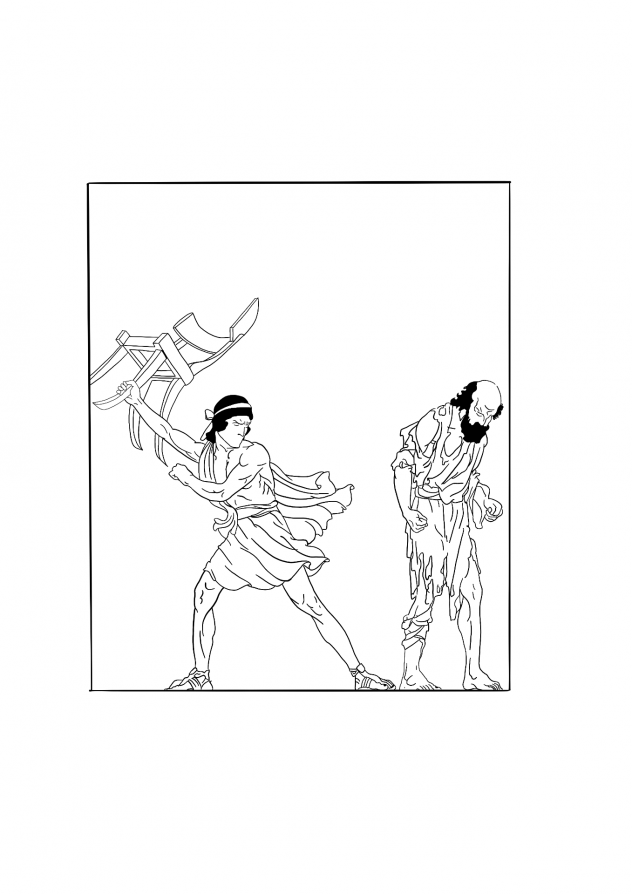The Odyssey
Fathers and Sons
Ananya Sengupta
The Odyssey has many life learnings. There is an extensive number of themes which are represented through the twenty-four stories. However, a theme that interests me the most is the relationship between father and son. Throughout the epic, it is clear that the father and son relationship is one of the most treasured relationships to the Greek people. Although the story is about Odysseus’ homecoming, there are multiple father and son relationships which are affected due to his absence.
As Odysseus is the protagonist of the story, the most noticeable father and son relationship is between Telemachus and Odysseus. However, the least prominent relationship would be between Poseidon and his Cyclops son, Polyphemus. In this story, fathers and sons stand up for each other and support one another. For some reason, whether they have just met each other for the first time, or have known each other for a long time, fathers and sons feel obligated to protect each other.
This interaction can be seen between Polyphemus and his father Poseidon. Polyphemus was blinded by Odysseus and didn’t want Odysseus to get away with what he has done. However, because he was blind he couldn’t punish Odysseus himself. Hence, he called out Poseidon for help. Although the intensity of their relationship is unexplored, it is assumed that they don’t know each other personally as Polyphemus says, “Listen, Earth-Shaker, Blue-Haired Lord Poseidon: acknowledge me your son, and be my father. Grant that Odysseus, the city-sacker will never go back home…”(9-530). Nevertheless, even though they don’t know each other, Poseidon takes action and helps his son. Poseidon hears Polyphemus’ prayer and almost destroys Odysseus’ ship. Ever since then, Poseidon has held a grudge towards Odysseus and makes sure that the protagonist will suffer before he manages to reach home. The father and son relationship shows that no matter the conditions, they will always stick together.
Another example of father and son relationships is the most prominent bond, Odysseus and his son Telemachus. In the Odyssey, the father and son spend a lot of time apart and it is through their distance, that they develop respect and appreciation for one another. In this case, Odysseus built the distance by being away from home for twenty years. Telemachus decided to go on a journey and look for Odysseus. It is during this journey that Telemachus is able to prove his worth to his father. The unique bond between them strengthens as Telemachus “desired to connect all along” (285) with his father. Telemachus never wanted to believe that his father was dead and when the opportunity offered itself, he risked it all to find him. Through Telemachus’ story, Odysseus saw himself in his son. There are some secrets which may not be sufficiently articulated by the father but are visible to their sons because of their natural bond.
According to Homer, every man should have a son who should avenge for him when he is not present. A son should look at his father as his role model whereas the father should protect his son from any harm. In this case, Odysseus protects Telemachus by killing the suitors while Telemachus does all he can to help out, and make sure that they succeeded.
Lastly, I feel that the most important “father-son” relationship is between Telemachus and Eumaeus. Although Eumaeus is a humble swineherd, after Telemachus’ return he exclaims, “Sweet light! You have come back, Telemachus. I thought that I would never see you anymore, after you sailed to Pylos. My dear child, come in, let me enjoy the sight of you now you are back.”(16-25). To which Telemachus responded with “Grandpa, yes” suggesting that as Odysseus was not present in Telemachus’ upbringing, there was an alternate father figure, that being Eumaeus the swineherd. In this scene, Homer portrayed how although his actual father Odysseus was absent, there were other fatherlike figures who were supportive of Telemachus. Thus proving that the relationship between “father and son” will always be present between men and boys regardless of the circumstances.
Telemachus’ journey to adulthood was incomplete and slow, making him the most vulnerable member in his family: as the suitors plot to murder him. Although physically, Telemachus is of age, he seems to lack psychological maturity as he did not have the support of his father. In the course of finding his biological father, Telemachus meets two-alternative father figures, the controlling Nestor and the rich and narcissistic Menelaus. Incidentally, both of these men who echo traits which are present in Odysseus. They teach Telemachus the skill of hospitality which is an essential aspect of “elite masculine adulthood”. However, only his real father Odysseus can help Telemachus achieve what he wants which is a position of greater power in his own household.
In this story, fathers and sons connect over revenge or vengeance. When Odysseus ultimately tells Telemachus who he really is, the two men share an embrace and immediately begin to discuss how to enact their revenge. Odysseus and Telemachus’ bond over vengeance and this is the ultimate connection to their relationship, similar to Poseidon supporting Polyphemus by taking revenge on Odysseus.

*Odysseus meets his father Laertes after returning home.
The reason why I have included this particular illustration (drawn by me) is because it represents all the elements of the father-son relationship I have mentioned in my essay. For instance, like Odysseus, Laertes too had missed a lot of time with his son. However, he still supported Odysseus after killing the suitors and proceeded to help him fend off the families of the dead suitors like Poseidon had supported Polyphemus













